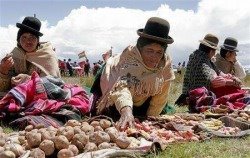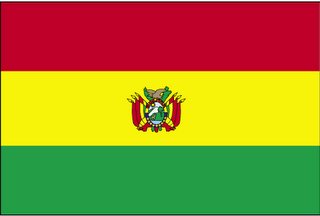The Coca Leaf Goes To Washington
In the first high-level visit by a Bolivian official since Morales took office in January - Bolivian Vice President Alvaro García Linera, led a delegation that included major opposition and business leaders to lobby for the renewal of a trade benefits package that expires at the end of the year. 
The prime motive of García Linera's four-day trip was to lay the groundwork for extension of the Andean Trade Promotion and Drug Eradication Act which expires in December. The pact gives Bolivia preferential access to the U.S. market, granting zero tariffs for several Bolivian products exported to the U.S since 2002.
It also aims to promote a non-drug-trafficking economy and is meant as an incentive to Andean countries for their cooperation in the War against Drugs. García Linera would like to see Washington extend the trade pact for at least another year while the Constituent Assembly finishes its work. Then the United States and Bolivia could discuss a long-term trade arrangement.
Calling the U.S. a ''strategic partner,'' García Linera stated that the Bolivian government is fully committed to democratic principals and to fighting drug trafficking, and that foreign investors had little to fear, despite a nationalization of the country's oil and gas industry on May 1.
The Vice President says the oil and gas industry is unique for government intervention because it represents a fifth of Bolivia's economy. And although the government will continue to seek higher royalty taxes from companies, foreign minority partners are still welcome.
He answered

The prime motive of García Linera's four-day trip was to lay the groundwork for extension of the Andean Trade Promotion and Drug Eradication Act which expires in December. The pact gives Bolivia preferential access to the U.S. market, granting zero tariffs for several Bolivian products exported to the U.S since 2002.
It also aims to promote a non-drug-trafficking economy and is meant as an incentive to Andean countries for their cooperation in the War against Drugs. García Linera would like to see Washington extend the trade pact for at least another year while the Constituent Assembly finishes its work. Then the United States and Bolivia could discuss a long-term trade arrangement.
Calling the U.S. a ''strategic partner,'' García Linera stated that the Bolivian government is fully committed to democratic principals and to fighting drug trafficking, and that foreign investors had little to fear, despite a nationalization of the country's oil and gas industry on May 1.
The Vice President says the oil and gas industry is unique for government intervention because it represents a fifth of Bolivia's economy. And although the government will continue to seek higher royalty taxes from companies, foreign minority partners are still welcome.

He answered
Labels: Evo Morales Bolivia CNASD





